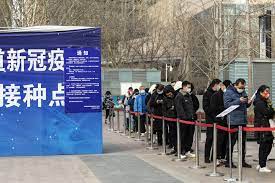Beijing struggles to sustain its zero-Covid model amid new variants
Tue 24 May 2022, 10:30:06

Chinese capital Beijing, which is in semi-lockdown, reported a record number of Covid cases during its current outbreak, reviving concerns that a Shanghai-style lockdown is staring in its eyes as authorities stubbornly seek to stamp out community spread of COVID-19 since the beginning of this month to ensure an elusive "zero-COVID" goal.
The city reported 99 cases for Sunday, up from 61 on Saturday. While the total is still low, the spike is one of the biggest since the outbreak started, with the case tally mostly hovering around 50 a day.
Capital city further escalated its COVID-19 restrictions which began on April 22 as the COVID-19 situation remains uncertain due to local transmissions.
Shopping malls, restaurant dining, indoor entertainment facilities and scenic spots remain suspended and work-from-home orders are imposed in many districts along with daily mass testing as a palpable sense of unease and fear permeates across the city.
On Saturday, some 5,000 residents of a Beijing residential compound were taken to hotel quarantine over 26 new infections, as social media users fear Beijing may see a reprise of extreme virus control measures used in Shanghai.
The overbearing enforcement of “zero-COVID” approach has evoked rare protests in prominent cities like Shanghai and Beijing by educated class like office goers, students and business community who promptly shared videos and memes on social media which became viral. Hundreds of students last week gathered to protest Covid rules at Beijing's elite Peking University.
“A Chinese lady in her thirties working for a Chinese state-owned company said on the condition of anonymity that youth in Beijing initially supported the “Zero-COVID” policy but now they don’t support it as it’s been too long and badly affected their daily lives and work.
This is too much but they cannot disobey the government orders,” she added. “I think the government has been too powerful, they don’t ask people whether you accept it or not. I feel bad for restaurant owners who are not allowed to open but need to pay for various operating costs like payment to staff, rent etc. and they are not getting any financial support from govt.
People cannot go out to eat and hang out with friends. Youth specially from big cities, the educated lot does not support it, but they cannot do anything,” she lamented.
She hoped that things come back to normal after the crucial party meeting this autumn in which President Xi Jinping is eyeing for his third term in power breaking the precedent. Experts say, abandoning the zero-COVID policy at this stage may cause some loss of political capital for the Chinese leadership
which does not want to rock the boat in this politically crucial year.
which does not want to rock the boat in this politically crucial year.
Shanghai’s lockdown and restrictions in other Chinese cities have beaten consumption, industrial output and other sectors of the Chinese economy in recent months, prompting pledges of support from the government with Premier Li Keqiang again coming to the front to reassure that the economic drag of Covid-19 controls will be temporary.
As Shanghai has shown some signs of movement relaxations, residents have again vented out their mental trauma with many terming it the hardest time in their life, in the last two months of lockdown.
Partial restart comes as curbs tightened in other areas, highlighting the difficulties of resuming life under China’s strict zero-Covid policy. Shanghai authorities have announced that they plan to lift its city-wide lockdown and return to more normal life from 1 June.
Chinese authorities have termed the COVID resurgence in many cities as complex which has forced China to give up its hosting rights of the AFC football tournament in 2023.
According to media reports, Apple is planning to boost production outside China, citing Beijing’s strict anti-Covid policy among other reasons. India and Vietnam, already sites for a small portion of Apple’s global production, are among the countries getting a closer look from the company as alternatives to China.
Apple’s heavy dependence on the country is a potential risk because of Beijing’s authoritarian Communist government and its clashes with the US, analysts have said.
European and American Chambers of Commerce have already lowered their investment plans and expectations from Chinese economy in the coming year owing to the harsh lockdown trampling economic activities.
Many expats have already left China or have changed their plans for a long-term stay due to the uncertainties caused by a rigid Chinese way of dealing with the things.
Amid such social and economic disruptions, detection of new variants is further putting challenges to China's zero-COVID policy. China reported the first case of the "more contagious" Omicron BA.4 variant of SARS CoV-2 virus.
The BA.4 variant was detected in an imported case on May 4 in Guangzhou, according to the Chinese CDC. Cases involving the BA.4 subvariant have been reported in at least 20 countries and regions, with a total of more than 1,300 cases.
On April 27, China reported the first infection caused by Omicron variant BA.2.12.1 which was also an imported case from Kenya. Multiple studies have shown that BA.2.12.1 spreads about 23-27 percent faster than BA.2.
No Comments For This Post, Be first to write a Comment.
Most viewed from International
Most viewed from World
AIMIM News
Latest Urdu News
Most Viewed
May 26, 2020
Do you think Canada-India relations will improve under New PM Mark Carney?
Latest Videos View All
Like Us
Home
About Us
Advertise With Us
All Polls
Epaper Archives
Privacy Policy
Contact Us
Download Etemaad App
© 2025 Etemaad Daily News, All Rights Reserved.



.jpg)






.jpg)
.jpg)








.jpg)
.jpg)
.jpg)
.jpg)
.jpg)

















